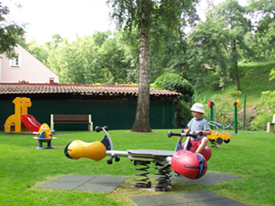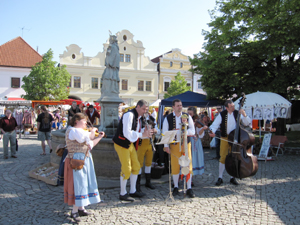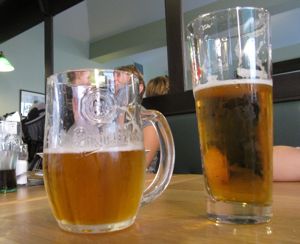- Home
- Czech life
A Little Czech Republic Culture
Czech Republic culture has held true through centuries of change.
Whether it be government changes, war or protest, the hearts of Czechs have held fast to their values, traditions and interests.
This page outlines a few descriptions of what makes Czechs, well, Czech.
This is Czech culture from an my simple point of view. It's not meant to paint a black and white picture of Czech people. You will find diversity in families and behaviors, always.
The following information is based on my experience, as a non-Czech person, living in Prague for more than 20 years.
Czech Families

Family is a key element of Czech Republic culture and is generally placed ahead of work. I would say that families are traditional in the sense that mothers and fathers continue standard roles of centuries past.
Families usually consist working parents. Although, it's common for women to stay home with children until the age of three on maternity leave.
From my experience, grandparents are often closely tied to their children and grandchildren. And, they offer an incredible range of experiences.
For example, many
grandparents have stories of war and very hard times while
their children grew up solely behind the Iron Curtain.
Family in Czech Republic
- a few notes:
• Families take regular holidays together - especially in August. They like to visit Mediterranean beaches and Czech National Parks.
• Prague is filled with playgrounds, sand pits and restaurants have become kid-friendly too.
• Children are generally well-behaved and taught to respect their elders. And, their desires aren't always first and foremost.
• Czechs like to celebrate holidays together and Sunday lunch is a family affair.
• Employers are generally sympathetic to family needs and considerate of needs at home.
• Both fathers and mothers are offered child leave by law.
Lifestyle
Czechs are fairly conservative by nature. Maybe it's the long history of struggles, but Czechs know how to save, reuse and harvest.
Also, compared to many Western countries, Czech Republic has a more balanced work and play relationship. Czechs love their leisure time and take full advantage of time away from work. Holidays are well planned and parks are well used.
Of course too, Czech Republic has the highest beer consumption in the world. Czech beer is like water to many citizens - it's just a basic way of life.
And, Prague has hundreds of pubs and places to have a drink. From a beer in the morning to wine at dinner, Czechs like to drink. (And don't forget Czech food!)
• Czech culture is a cottage culture. Many families have small cottages that they visit whever possible. Prague can feel especially deserted on weekends in the summer.
• Czechs love the outdoors. From gardening at their cottages to cross-country skiing, Czech Republic culture is marked by outdoor activities.
• People enjoy dining out in Prague. Many social gatherings are in restaurants or around the table at home.
• Despite the many churches in Prague, the majority of people don't attend church. Non-believers are the majority after a long bout of Communism
• Czechs have a dark sense of humor. They love to make fun of themselves and the government.
Etiquette and Customs

We can't discuss Czech Republic culture without at least mentioning etiquette. Czechs value well-mannered folks and love a behaved child. And, older people in particular will openly frown on "strange" behavior.
The number one custom just might be a social greeting. Children are taught from an early age to say "Dobrý den" to most everyone except friends and families. If you visit Czech Republic, it's a great idea to learn at least this one phrase. It's not expected from foreigners but highly appreciated.
Study your Czech phrases before your visit.
Other customs:
• It's also customary to give
up
your seat on the metro, etc. to an older person or
a small child. Czech Republic culture is definitely of the Respect
Your Elders type.
• If you visit someone's home or even an office of some
kind, you are generally expected to take off your shoes.
Many homes will even have slippers for you!
• Also, if you visit a home, feel free to bring flowers or a
little something to offer like something sweet.
***Of course, you may find moments where you
think Czechs lack etiquette. For example:
• Czechs have a different sense of physical space than in
some Western countries. If you feel crowded on the tram,
don't take it personally. Personal space is not as important within Czech Republic culture.
• Queues can sometimes be confusing and very first-come-first-served
occasions. I've been in countless lines where someone has
skipped in front of me.
• Nepotism is
widespread in Czech Republic culture. If you visit the
doctor or even someone of "power" it's okay to bring flowers
or chocolate.
Sports and Cultural Events

Czechs are mad about football (soccer) and hockey. The national teams for both sports are well respected worldwide and always have a huge following locally. Each sport also has popular domestic leagues.
Average Czechs enjoy lots of outdoor activities and sports. The Czech Republic is filled with well-marked tourist trails. These are often used by a combination of skiers, bikers and walkers. Holidays to various national parks are very popular. In the summer you can find numerous cars leaving Prague with bikes on the roofs.
The tongue-in-cheek national pastime of Czech Republic is mushrooming. Czechs hunt the forests for free mushrooms every year. Don't be surprised to see a train full of wicker baskets and rubber boots in the autumn. The mushrooms are stored for use in soups and meals all winter long.
On the other hand, Czech Republic culture is filled with arts and cultural events. I imagine that Czechs are more likely to know a famous violinist than other citizens.
Czechs love to attend the theatre and there are many small theatres in Prague. Each one offers an eclectic variety of music and small theatre productions. Summer festivals are also very common - theatres and performances for children included.
Czech Holidays
Czech
holidays
are a great barometer of Czech Republic culture. Czechs
celebrate many standard holidays but with their own spin.
And, there are numerous traditional celebrations throughout
the year as well. There is a long history here of marking
the seasons with different festivities and characters.
Here are a few holiday tidbits:
• Czech calendars
note a name on each day of the year. So, if today 's name
day is Martina, then Martina is celebrating her Name Day
(Svátek). Children receive small gifts on their name
day and people are generally wished well. And flower
shops have signs out front announcing each name... Today is Martina's name day.
• New Year's is
fairly traditional with fireworks and celebrations. Many
Prague locals like to exit the city for the forests and
mountains. While Prague is swamped with tourists.
• Easter includes colored eggs and boys chasing girls with willow branch switches. Traditionally a boy can spank a girl with a branch to fend off ugliness for the year - while the girl commerates the occasion by giving the boy a painted egg.
• Christmas is considered the 24th of December and most families have a large dinner with the traditional meal being fried carp.
More about Christmas in Prague.
Other state holidays include: 01 May, Labor (May) Day; 5 July, Saints Cyril and Methodius; 6 July, Jan Hus Day; 28 September, St. Wenceslas Day; 28 October, Independent Czechoslovak State Day; 17 November, Struggle for Freedom and Democracy Day.
More Czech Republic Culture
Related Articles
You can't understand one's culture without digging into their food. We've got more about Czech cuisine and even some classic Czech recipes for you.
Have a question regarding Czech Republic culture? Contact me!
- Home
- Czech life
Recent Articles
-
Michelin Key Hotels in Prague: 2025 Winners - What's Your Favorite?
Nov 01, 25 04:16 PM
Michelin Key hotels in Prague were revealed for 2025. Discover 8 stunning stays awarded for comfort and unforgettable guest experiences. Which will you choose? -
Prague Star Palace: The Hidden Forest Retreat Locals Love
Oct 22, 25 03:25 PM
Step off the tourist trail and discover the Prague Star Palace. A six-pointed Renaissance gem surrounded by woods and trails, just outside the city center. -
Queen Anne’s Summer Palace: A Quiet Gem in Prague Castle Gardens
Jul 30, 25 12:08 PM
Is Queen Anne's Summer Palace the most beautiful building in Prague? Find out for yourself as you uncover its story, Renaissance architecture and peaceful garden.



